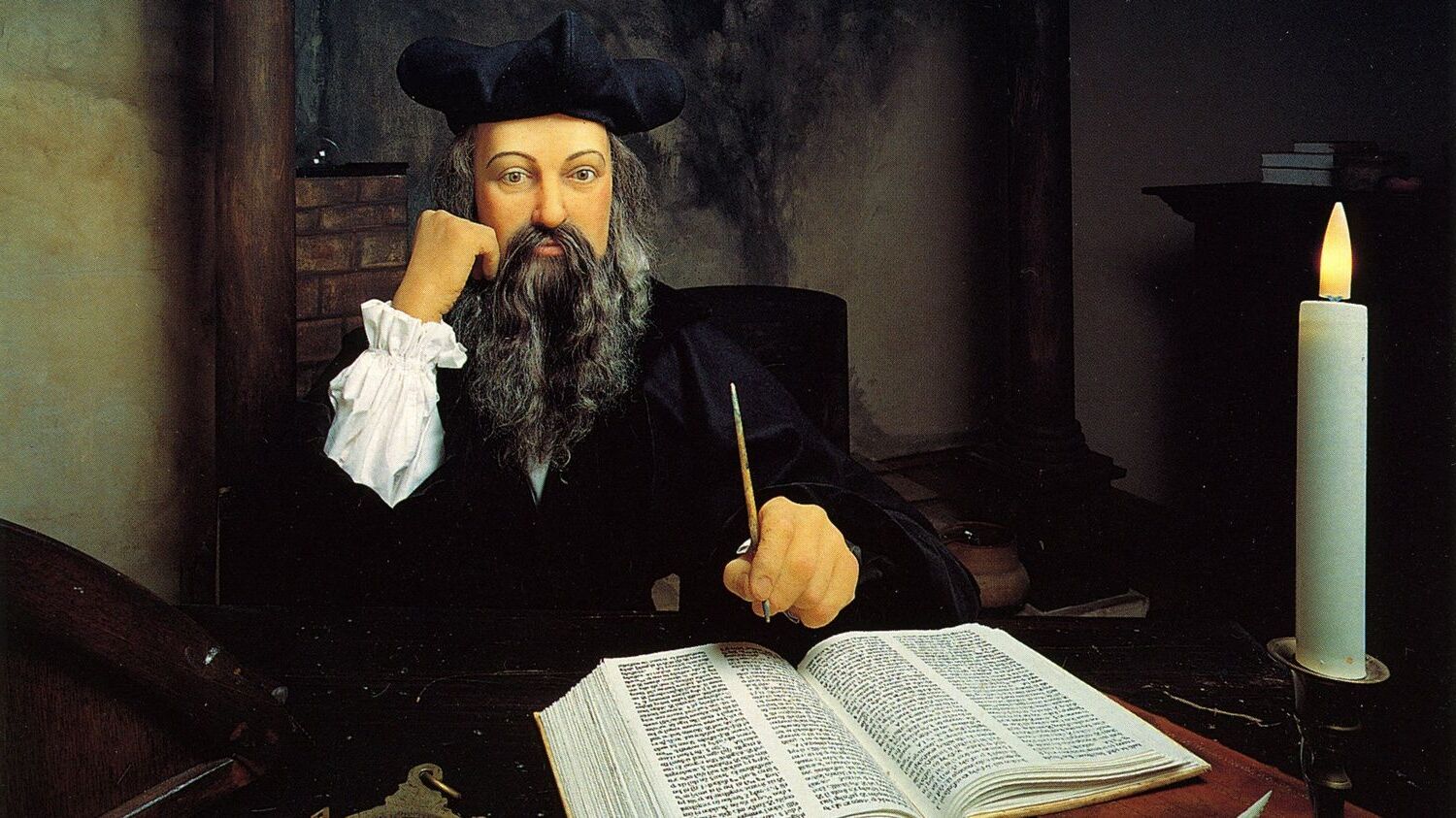
Who was Nostradamus? Born Michel de Nostredame in 1503, Nostradamus was a French astrologer, physician, and seer whose prophecies have fascinated people for centuries. Known for his book "Les Prophéties," he penned quatrains that many believe predict future events. His writings, often cryptic and open to interpretation, have sparked endless debates about their accuracy and meaning. Despite skepticism, his work remains influential, captivating both historians and conspiracy theorists. Whether seen as a visionary or a charlatan, Nostradamus has left an indelible mark on history. Join us as we delve into 28 intriguing facts about this enigmatic figure.
Key Takeaways:
- Nostradamus, a French astrologer and physician, wrote prophecies that continue to fascinate people. His work has inspired books, movies, and even music, leaving a lasting impact on popular culture.
- Nostradamus used unique methods, such as scrying and meditation, to make his predictions. His influence on astrology and his lasting legacy continue to captivate modern practitioners.
Who Was Nostradamus?
Nostradamus, born Michel de Nostredame, was a French astrologer, physician, and reputed seer. His prophecies have fascinated people for centuries. Let's dive into some intriguing facts about this enigmatic figure.
-
Nostradamus was born on December 14, 1503, in Saint-Rémy-de-Provence, France. His family was of Jewish descent but converted to Catholicism.
-
He studied medicine at the University of Avignon and later at the University of Montpellier. However, he was expelled from Montpellier for working as an apothecary, which was against university regulations.
-
Nostradamus began his career as a healer during the plague. He traveled extensively, treating victims and developing innovative methods for combating the disease.
Nostradamus' Prophecies
Nostradamus is best known for his book "Les Prophéties," a collection of 942 poetic quatrains that are said to predict future events.
-
"Les Prophéties" was first published in 1555. It has never been out of print since its initial publication.
-
Nostradamus wrote his prophecies in a mixture of languages. These included French, Greek, Latin, and Occitan, making them difficult to interpret.
-
He used a technique called "bibliomancy" to write his prophecies. This involved randomly selecting passages from books and using them as inspiration.
-
Many believe Nostradamus predicted the Great Fire of London in 1666. One quatrain mentions "The blood of the just will be demanded of London, Burnt by fire in three times twenty plus six."
Controversies and Criticisms
Nostradamus' work has not been without its critics. Some argue that his prophecies are too vague to be meaningful.
-
Skeptics argue that Nostradamus' predictions are so general they could apply to almost any event. This phenomenon is known as the "Barnum effect."
-
Some scholars believe Nostradamus borrowed heavily from earlier sources. They argue that his work lacks originality and is merely a rehash of older prophecies.
-
Despite the criticisms, Nostradamus has a significant following. Many people continue to study his work and believe in his prophetic abilities.
Nostradamus' Influence on Popular Culture
Nostradamus has left an indelible mark on popular culture, inspiring books, movies, and even music.
-
The 1981 film "The Man Who Saw Tomorrow" is based on Nostradamus' prophecies. Orson Welles narrated the documentary, which explores various predictions.
-
Nostradamus has been referenced in numerous songs. Artists like Al Stewart and Judas Priest have mentioned him in their lyrics.
-
He has appeared as a character in various TV shows and movies. These include "The Simpsons," "Charmed," and "Supernatural."
Personal Life and Legacy
Nostradamus' personal life was as intriguing as his prophecies. He faced many challenges but left a lasting legacy.
-
Nostradamus married twice and had six children. His first wife and children died from the plague, a tragedy that deeply affected him.
-
He was a practicing physician until his death. Despite his fame as a seer, he continued to treat patients throughout his life.
-
Nostradamus died on July 2, 1566. He was buried in the Franciscan chapel in Salon-de-Provence.
-
His tomb was reportedly opened during the French Revolution. Legend has it that a medallion with the exact date of the opening was found inside.
Nostradamus' Predictions and Modern Events
Many believe Nostradamus predicted several significant modern events. Let's explore some of these claims.
-
Some say Nostradamus predicted the rise of Adolf Hitler. A quatrain mentions "From the depths of the West of Europe, A young child will be born of poor people."
-
He is also said to have foreseen the assassination of John F. Kennedy. One quatrain reads, "The great man will be struck down in the day by a thunderbolt."
-
Nostradamus allegedly predicted the 9/11 attacks. A quatrain mentions "Two steel birds will fall from the sky on the Metropolis."
Nostradamus and Natural Disasters
Nostradamus' prophecies often touch on natural disasters. Some believe he predicted several significant events.
-
He is said to have predicted the 2004 Indian Ocean tsunami. A quatrain reads, "The earth and air will freeze a great sea, When they come to venerate Thursday."
-
Nostradamus allegedly foresaw the 2011 Fukushima nuclear disaster. One quatrain mentions "The great one will cause it to be dragged in an iron cage, When the brother will die at dawn and dusk."
Nostradamus' Methods and Tools
Nostradamus used various methods and tools to make his predictions. These techniques have fascinated scholars for centuries.
-
He used a bowl of water and a wand to enter a trance-like state. This method, called "scrying," helped him see visions of the future.
-
Nostradamus often meditated for hours before writing his quatrains. This practice helped him focus and channel his prophetic abilities.
-
He kept his methods secret to avoid persecution. During his time, making predictions could be seen as heretical.
Nostradamus' Impact on Astrology
Nostradamus' work has had a lasting impact on astrology. His methods and predictions continue to influence modern astrologers.
-
He was one of the first to use planetary alignments in his predictions. This approach has become a standard practice in astrology.
-
Nostradamus' work has inspired countless astrologers. Many modern practitioners study his methods and incorporate them into their own work.
-
His legacy continues to grow. Despite the passage of centuries, Nostradamus remains a significant figure in the world of prophecy and astrology.
Nostradamus: A Timeless Enigma
Nostradamus remains a figure of endless fascination. His predictions have sparked debates, inspired books, and even influenced pop culture. Whether you believe in his prophecies or see them as mere coincidences, there's no denying his impact on history. His writings continue to be studied, analyzed, and interpreted by scholars and enthusiasts alike. Some see him as a visionary, while others view him as a clever writer who knew how to capture the imagination of his time. Either way, Nostradamus's legacy endures, reminding us of the human desire to understand the future. His life and works offer a glimpse into the past and a mirror to our own hopes and fears. So, next time you hear a prediction attributed to Nostradamus, you'll know there's more to the story than meets the eye.
Frequently Asked Questions
Was this page helpful?
Our commitment to delivering trustworthy and engaging content is at the heart of what we do. Each fact on our site is contributed by real users like you, bringing a wealth of diverse insights and information. To ensure the highest standards of accuracy and reliability, our dedicated editors meticulously review each submission. This process guarantees that the facts we share are not only fascinating but also credible. Trust in our commitment to quality and authenticity as you explore and learn with us.


